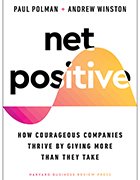IT influences shift to net positive enterprise
In this Q&A, business sustainability expert Andrew Winston discusses why companies need to become net positive by contributing more than they take.
Companies are paying more attention to sustainability by, for example, initiating programs to rein in carbon emissions and improve social conditions.
While efforts like these are necessary, companies need to think bigger and become far more ambitious to become forces to affect change on issues such as climate change and inequality. This is one of the main themes of Net Positive: How Courageous Companies Thrive by Giving More Than They Take, a book coauthored by Andrew Winston, business sustainability consultant, and Paul Polman, former CEO of global CPG giant Unilever.
Enterprise technology can play a significant role in advancing sustainability efforts, but the issues are complex and becoming net positive will require companies to radically rethink and reconfigure their business models, according to the authors.
In this Q&A, Winston, a global consultant on corporate sustainability and adviser on environmental, social and governance strategies, discusses the concept of becoming a net positive company and some of the roles that enterprise technology can play in the process.
What does it mean to be a net positive company?
 Andrew Winston
Andrew Winston
Andrew Winston: Paul Polman and I define a net positive business as one that succeeds and profits by solving the world's problems, not causing them, and improving the well-being of everybody that they impact. The core question we're asking is, 'Is the world better off because your business is in it?' We've been buried in this idea that all you need to worry about is shareholder profits in the short run, and it's increasingly clear that that's not enough. It's not fulfilling, it's not what younger people want, it's not compatible with life on the planet on some level. We have serious problems -- climate and inequality above all -- and we need companies to start being serious solution providers, regenerating and healing the damage we've all done.
The issues are very complex and even companies that have pledged to become net positive like Unilever face issues. How can companies deal with those complexities?
Winston: Unilever has probably pushed harder than almost any other large company in the world, but they're not net positive -- nobody is. But the core message in the book is that, given the scale of the problems, we need to work in partnerships and coalitions and solve systemic problems. Nobody is net positive because it's not really possible yet.
For example, if you wanted to be zero carbon or all renewable energy -- which a huge number of large companies have set as their goal -- the grid isn't entirely renewable, so you literally can't plug in and say you are zero carbon. None of this is easy, and the successful work in this arena tends to be partnership based and solves hurdles that are in the way for everyone. There's a bunch of easy stuff: You can cut energy, change your lighting, buy a bunch of renewables. But the bigger problems like packaging and plastics, if you're Unilever, are big problems. We're going to need massive amounts of data and tracking and understanding of value chains to really move the needle. You also need experiments with different business models, like reusable containers, where you send the container back and it's cleaned and [used again].
What are some other aspects of being net positive beyond the carbon footprint?
Winston: It's far more than just a carbon footprint. It's about the full agenda of the business's role in society -- it's safety, it's human rights, it's living wages, and your impacts on the communities that you operate in.
Most companies have a few key areas that they are more likely to be engaged in, so they're not going to be involved in every problem in a serious and focused way. They have to pick some battles that most apply to them. For the tech industry, on the physical side, it's footprint, but it's also waste, end-of-life materials, mining. For tech, there's also misinformation and the use of technology for information, which is arguably the largest problem in the world. It's undermining all action on anything we need to do together. Facebook can talk about being net-zero on carbon, which is great, but right now [Facebook] is ripping apart democracy through its platform. So it's not possible [to be net positive] even if it got to positive carbon results -- there's still another realm of its existence. You have to look at the full impact of the company, across the world on everyone that it impacts.
Tech has played a role in fostering net positive goals, but there are limits to what tech can do. For example, Unilever uses a blockchain-based application to track the provenance of palm oil sourcing, but it doesn't tell much about things like labor conditions on plantations. Do we expect too much from tech to solve the problems?
Winston: You can track almost anything and increasingly they are tracking which farms something came from and how they are managed. There are certifications, but they're not perfect. But there's been real success in recent years in palm oil and making the farmers much more sustainable, reducing the amount of deforestation. It's a complicated story, there's a lot going on and tracing is part of it. You want to know that you're getting it from the places where the hard work on system change has happened and the farms are being run differently, so things like blockchain are certainly going to help.
The big upside for where data and tech come in, is that we're on the verge of massive efficiency improvements in the way buildings are run, the amount of energy they use, in how transportation works, in our logistics. Look at how Waze increased traffic flow, the reduction of emissions is pretty dramatic because they re-route people and they aren't sitting in traffic. The data tracking on all of our systems -- buildings, transportation, manufacturing, digital twins of operating systems -- that's the upside of all the technology and the data that we're collecting. For example, a John Deere tractor is like a supercomputer now, there's so much data and technology and GPS involved in what used to be a pretty simple machine. We're going to see some real exponential change in the efficiency of how we use resources, which we desperately needed.
So the gathering and smart use of data is a key to becoming net positive?
Winston: We're on the verge of much more data being conveyed to people about the decisions they make. Unilever is heading toward trying to put carbon data on 70,000 products. We'll see more of that, and it will get easier as we have better data about entire value chains, such as Scope 3 data. It's going to be anarchy for a while and definitions are hard, companies are getting too many questions from too many places, so there has to be harmonization of all that. It's all going to come together; it's going to be a little ugly for a while, but then it's going to get much more systematic and we'll start to see some real gains in efficiencies.
One of the aspects of being net positive is thinking long-term, but many companies are still focused on short-term. How can they start thinking more about the long term?
Winston: It's hard, and short termism is the biggest challenge. Part of the way that [Polman] tried to solve it at Unilever was that he stopped quarterly reporting and guidance within a few weeks of becoming CEO. This freed up middle-management and senior people to think a little longer. They still have to be successful and have profits, but they can take a longer view because short-termism hasn't just hurt us around sustainability. R&D in the business world has dropped steadily for decades because it's long term and it's expensive. We're consistently cutting to the bone, we see it in our infrastructure and our roads, which are deteriorating; we don't have the grid we need for the renewable energy.
It's not as if this short-term thing has been great for everybody -- it's created massive inequality. It's been really good for the top, the C-suite and the major shareholders and hedge funds. So how do you change that dynamic? It's difficult, but part of it is that younger generations are coming into the business world, and they want more meaning in their companies, they want values, they want leaders who walk the talk. Companies that ignore this are going to have a harder time attracting and retaining people and thriving as a business. The short-term dynamic is going to change painfully through changing norms, as it becomes unacceptable to do certain things and acceptable to do others, but we're getting there. It may seem like there's nothing changing but that can pivot quickly when we hit these tipping points, and we're doing that on carbon right now. Decarbonizing your business is increasingly just how you have to operate.
Jim O'Donnell is a TechTarget senior news writer who covers ERP and other enterprise applications for TechTarget Editorial.







